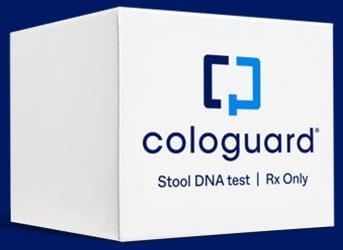THE COLOGUARD TEST VS FIT
Cologuard® is the best-in-class noninvasive screening option in detecting colorectal cancer (CRC) and precancer vs FIT1-4*
-
Cologuard Plus™
-
Cologuard
The Cologuard Plus test has superior sensitivity vs FIT1*
Based on a subset of 18,911 average-risk patients aged 45-84 years from a prospective, multicenter study.1†:
FIT failed to detect 6 times more total CRC findings (stage I to IV)1

91% specificity with the Cologuard Plus test‡ vs 95% with FIT.1
- The Cologuard Plus test detected ~2x more advanced precancerous lesions than FIT1§
- The Cologuard Plus test detected ~10x more sessile serrated lesions than FIT1||
The Cologuard Plus test more effectively detects precancer vs FIT1*

Better outcomes with the Cologuard Plus test
Explore more data comparing noninvasive options.
The Cologuard Plus test1,2
Detects 5 biomarkers
Detects methylated DNA markers and hemoglobin
Optimized molecular panel
Consistent detection of both left- and right-sided cancers

FIT3,5
Detects 1 biomarker
Only detects hemoglobin in stool
Detects hemoglobin from polyps or lesions that bleed intermittently
Less effective detection of proximal cancers
The Cologuard test demonstrated superior sensitivity vs FIT* in detecting CRC and advanced precancerous polyps3,4
In a 2014, prospective, head-to-head, point-in-time, 90-site, pivotal study of 10,000 patients aged 50 to 84 years at average risk for CRC, the Cologuard test demonstrated3†:
FIT failed to detect 3 times more total CRC findings (stage I to IV)3

87% specificity with the Cologuard test¶ vs 95% with FIT.3
- The Cologuard test detected ~2x more advanced precancerous lesions than FIT4#
- The Cologuard test detected ~9x more sessile serrated lesions than FIT4**
The Cologuard test detects precancer more effectively vs FIT4*

Better outcomes with the Cologuard test
Explore more data comparing noninvasive options.
Higher sensitivity makes the Cologuard test the superior CRC screening option vs FIT3,4
The proprietary Cologuard sDNA technology can analyze and detect 11 distinct biomarkers that are used to identify CRC and precancerous polyps.3,4
The Cologuard test3,4
Detects 11 biomarkers
Detects altered DNA and hemoglobin
Detects biomarkers that are continuously shed into the stool
Consistent detection of both left- and right-sided cancers

FIT3,5
Detects 1 biomarker
Only detects hemoglobin in stool
Detects hemoglobin from polyps or lesions that bleed intermittently
Less effective detection of proximal cancers
FIT only detects hemoglobin in stool, increasing the chance of a false negative result due to intermittent bleeding.3,5
- OC-Auto® Micro 80, Polymedco, Inc. was the comparator to the Cologuard Plus test. OC FIT-CHEK, Polymedco, Inc was the comparator to the Cologuard test.
- Screening colonoscopy was the reference method.1,3
- Cologuard Plus specificity: 91% overall specificity, including all participants who did not have advanced neoplasia. Specificity for no colorectal neoplasia was age-weighted to the US population and defined as a negative colonoscopy, no adenocarcinoma of the colorectum, no adenomas, and no sessile serrated polyps/sessile serrated adenomas.1
- The Cologuard Plus test detected 43% of advanced precancerous lesions vs 23.3% with FIT (P<0.0001).1
- The Cologuard Plus test detected 49% of sessile serrated lesions with dysplasia, traditional serrated adenomas, conventional adenomas with serrated architecture, and sessile serrated lesions ≥10 mm vs 5% with FIT.1
- Cologuard specificity: 87% overall specificity, excluding CRC and advanced adenomas, and including all nonadvanced adenomas, nonneoplastic findings, and negative results on colonoscopy. There was 90% specificity in participants with no lesions biopsied on colonoscopy.3
- The Cologuard test detected 42% of advanced adenomas compared to 24% with FIT (P<0.001).4
- The Cologuard test detected 43% of sessile serrated lesions ≥10 mm vs 5% with FIT (P<0.001).4
FIT=fecal immunochemical test; sDNA=stool DNA.
